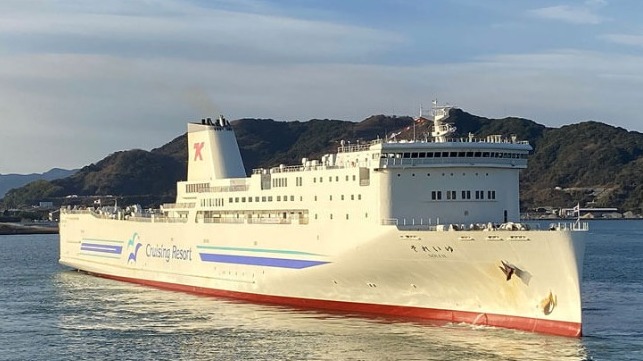Japan Runs First Test of Fully Autonomous Navigation on a Large Ferry

Demonstration tests were completed yesterday in Japan on what is being called the world’s first fully autonomous ship navigation systems deployed on a large car ferry. The demonstration, which was conducted in southern Japan on a 15,500 gross ton Ro-Pax ferry, is part of the first of a series of tests planned as part of a project to develop fully autonomous navigation system concepts being led by The Nippon Foundation.
During the voyage, the 730-foot ferry Soleil traveled approximately 150 miles between Shinmoji and Iyonada, which takes approximately seven hours. The vessel operates at speeds of up to 26 knots during the trip.
“This demonstration test greatly accelerated the development of fully autonomous ship navigation systems using many advanced technologies, including artificial intelligence,” said Naoki Ueda, Executive Vice President, Mitsubishi Shipbuilding Co. “We will continue to develop technologies using the valuable knowledge gained to achieve safety and high-quality service for passenger ferries.”
The vessel, which entered service in July 2021, is equipped with a high-precision sensor image analysis system with infrared cameras that can detect other ships even in darkness as well as an automated ship navigation system that includes an avoidance function. Mitsubishi Shipbuilding was responsible for the integration of the system that also includes an advanced automated port berthing/unberthing operation system that can perform turning and reversing movements. Shin Nihonkai Ferry Co. was in charge of setting the vessel’s system requirements and conducting the demonstration test.
After entering service in July, the Soleil operating with its crew began compiling data for the development of a fully autonomous ship navigation system. According to the companies, one of the biggest issues of a fully automated vessel is fault prediction. As part of the tests on the Soleil, they are developing enhanced engine monitoring technologies that monitor motor conditions board the vessel during normal operations.
“This was the world’s first fully autonomous ship navigation of a large vessel of over 200 meters in length with a maximum running speed of 26 knots, and I hope this will lead to further development toward practical use,” said Mitsuyuki Unno, Executive Director of The Nippon Foundation after the successful demonstration. “There are still many issues to be resolved, however, and I believe today’s results will be a guide toward the creation of international rules for fully autonomous vessels.”

that matters most
Get the latest maritime news delivered to your inbox daily.
The Nippon Foundation launched the MEGURI 2040 fully autonomous ship navigation project in February 2020 through support for five consortia, which will all be conducting demonstration tests to verify their fully autonomous navigation system concepts from January to March 2022. Among the goals the foundation aims to address will be to resolve issues in coastal shipping including improved safety, crew labor savings, and cost reductions.
Research and development of fully autonomous ship navigation is intended to address maritime issues including crew shortages and accident prevention. This is also expected to become a “future industry” through which Japan can demonstrate to the world its advanced technologies in areas including ICT, AI, and image analysis technology.
